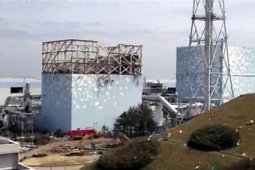 Japan will sack three top energy officials over their handling of the Fukushima atomic disaster and scandals that have fuelled public mistrust in the country’s nuclear policy.
Japan will sack three top energy officials over their handling of the Fukushima atomic disaster and scandals that have fuelled public mistrust in the country’s nuclear policy.
Banri Kaieda, the minister of economy, trade and industry, told a press conference that he was planning sweeping staff changes at his powerful ministry, which both promotes and regulates the nuclear industry.
Mr Kaieda said the reshuffle aimed to “breathe new life” into the ministry.
He signalled the changes would include his ministry’s top bureaucrat, a vice-minister, and the heads of the ministry’s Agency for Natural Resources and of the watchdog body, the Nuclear and Industrial Safety Agency.
“Regarding the personnel changes, we have been discussing that for about a month,” Mr Kaieda said.
“It will be on a significant scale.”
When asked whether the changes will include the top three energy officials, Mr Kaieda responded: “It’s OK for you to think that.”
He said the changes would be officially announced later, without specifying when.
Since the March 11 earthquake-tsunami disaster that sparked the nuclear crisis, the ministry has come under intense criticism for its promotion of nuclear power and for seeking to manipulate public opinion by planting questions at open talks.
Strain
The comments followed a news report that prime minister Naoto Kan and Mr Kaieda were in the final phase of talks about the personnel changes, and that Mr Kaieda himself was considering resigning soon after he dismisses the top officials.
Mr Kaieda, who has been at odds with the prime minister in recent months, showed the strain on him amid the almost five-month-old nuclear crisis when he broke into tears during a recent grilling by opposition lawmakers.
Mr Kan, a former grassroots activist, has advocated a nuclear-free Japan and criticised the ministry, which has formed cosy ties with the energy industry.
Power companies have given cushy jobs to many retired government officials.
The public has grown distrustful of Japan’s nuclear policy amid the world’s worst nuclear crisis since Chernobyl 25 years ago at the Fukushima Daiichi nuclear plant, run by Tokyo Electric Power Company (TEPCO).
Public anger has intensified in recent weeks after media reported that the safety agency had asked power companies to mobilise their workers and contractors to plant questions in support of nuclear energy at public talks.
The nuclear safety agency, which should regulate but not promote nuclear energy, said it would create a third-party panel to investigate the matter.
Mr Kan is planning to split the watchdog agency away from the industry ministry to boost its independence and regulatory strength.


